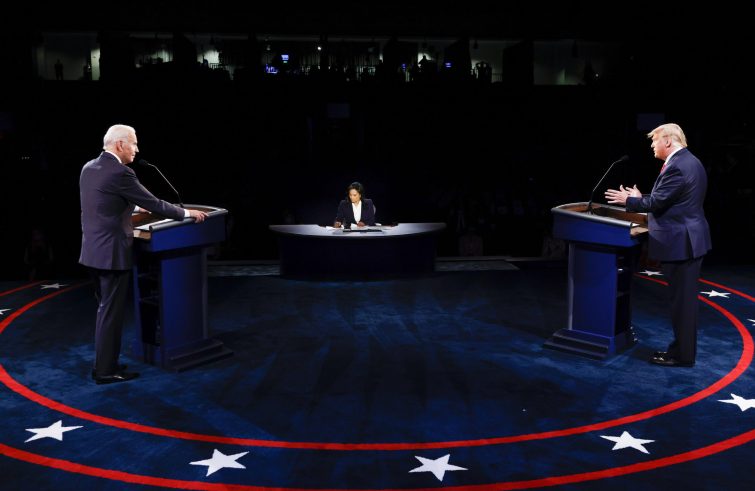
A toned-down debate, with the same old script in terms of accusations and election programs, featuring a not-so-brazen Trump and an occasionally fiery Biden. During the last presidential debate, 12 days out of November’s election, neither candidates presented the aggressive posture of the first chaotic debate, in which Trump and Biden traded insults. The new rules envisaging silenced microphones for the non-speaking candidate might have contributed to the outcome.
The moderator, Kristen Welker of NBC News, managed to keep order between the Republican President and the Democratic candidate,
as she pressed them about the health and economic crisis caused by the coronavirus, foreign interference in the elections, the candidates’ finances, healthcare reform and racial justice.
The US President reiterated the narrative of 2.2 million deaths without his timely intervention, heavily contested by Biden who envisioned a “dark winter” for the country, stating that people are being forced to cope with death rather than mastering life.
The vaccine was another major theme, and Trump repeated that doses would be available very soon. When the moderator pressed for a deadline, the answer was “around the end of the year.”
Healthcare was also a focus of the so-called Obamacare reform, which Trump intends to repeal and replace it with measures safeguarding treatment to applicants for insurance with an already existing pathology. The counter-proposal of the democratic candidate is Bidencare, which provides for public health protection options.
Trump complied with the recommendations of his advisors by putting the spotlight on Biden,
starting from the money earned abroad, to Biden son’s involvement in an allegedly shady business in Ukraine, backed by an unverified article in the New York Post, the contents of which were considered Russian disinformation by more than 50 former intelligence officials. Biden skilfully raised the issue first and then shifted the focus from his family, to the family of Americans and their suffering also due to the job crisis, to a minimum wage of 6 or 7 dollars, which the Democratic candidate seeks to raise to 15 without affecting government budget.
Trump’s Chinese bank account dominated the conversation on financial matters,
testified by ongoing private business dealings with Beijing, while the trade and diplomatic war is flaunted to the public. Biden asked that Trump promptly reveal tax returns, but his opponent deflected by postponing the date to after November 3, while displaying what is no longer his strong suit: being an “outsider” businessman versus an establishment man.
Trump’s claims on immigration equally followed the same old script.
The president appeared clumsy in commenting on his response to children separated at the border, and he couldn’t refrain from the rhetoric on rapist, violent, criminal immigrants: a successful political line in the previous campaign, but now utterly inappropriate in the ongoing crisis in the country. The racial justice issue saw Biden’s apology and his acknowledgement of mistakes over a 1994 Law that caused increased incarceration of African Americans; on the other hand Trump claimed that he has done more for the African American community than any president since Abraham Lincoln, adding that he was “the least racist person in the room.”
In conclusion, the final debate saw no winners or losers, as it was close to the upcoming election, and because more than 47 million people have already voted and decided.
Last night, the candidates addressed undecided voters, and the debate was less resentful and insulting than the first one, while reality unfolded against the show.












